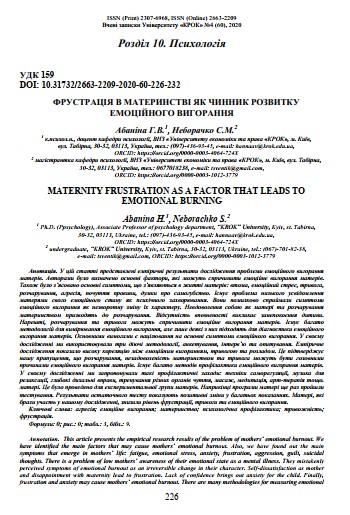MATERNITY FRUSTRATION AS A FACTOR THAT LEADS TO EMOTIONAL BURNING
DOI:
https://doi.org/10.31732/2663-2209-2020-60-226-232Keywords:
aggression, anxiety, emotional burnout, motherhood, frustration, psychoprophylaxisAbstract
This article presents the empirical research results of the problem of mothers’ emotional burnout. We have identified the main factors that may cause mothers’ emotional burnout. Also, we have found out the main symptoms that emerge in mothers’ life: fatigue, emotional stress, anxiety, frustration, aggression, guilt, suicidal thoughts. There is a problem of low mothers’ awareness of their emotional state as a mental illness. They mistakenly perceived symptoms of emotional burnout as an irreversible change in their character. Self-dissatisfaction as mother and disappointment with maternity lead to frustration. Lack of confidence brings out anxiety for the child. Finally, frustration and anxiety may cause mothers’ emotional burnout. There are many methodologies for measuring emotional burnout but only few of them suit for the diagnosis of mothers’ emotional burnout. The major requirements are to aim at the main symptoms of emotional burnout. In our research we used three valid methodologies, questionnaire, interviews and survey. An empirical research has shown high correlations between emotional burnout, anxiety and frustration. This confirms our presumption that frustration, dissatisfaction with motherhood and anxiety may be the main reasons for mothers' emotional burnout. There are many methods of mothers’ emotional burnout prevention. In our research we have proposed the following preventive measures: self-regulation techniques, music for relaxation, deep breathing exercises, training of various sense organs, massage, meditation, art therapy, etc. We have created a special program for preventing emotional burnout of mothers. That was conducted for the experimental group of mothers. At the end of the program mothers have completed testing one more time. The results of the final test show positive changes in many indications. Mothers who participated in our research got reduced levels of frustration, anxiety and emotional burnout.
Downloads
References
Абаніна Г. В. Використання наративних практик для подолання наслідків психотравмуючих ситуацій. Особистість в умовах кризових викликів сучасності: матеріали методологічного семінару НАПН України (24 березня 2016 року) / За ред. академіка НАПН України С.Д. Максименка. Київ, 2016. С. 427-433.
Абаніна Г. В. Стратегії опанування психотравматичного досвіду в контексті наративного підходу. Правничий вісник Університету «КРОК». 2017. Вип. 27. С. 140-144.
Базалева Л. А. Возможности исследования эмоционального выгорания у матерей в психологии личности. Вестник Адыгейского государственного университета. Педагогика и психология. 2010. №3. С. 1-9.
Базалева Л. А. Личностные факторы эмоционального “выгорания” матерей в отношениях с детьми: дисс. … канд. психол. наук: спец. 19.00.01 Общая психология личности и история психологии. Краснодар. 2010. 202 с.
Берковиц Л. Агрессия: причины, последствия и контроль : лучший в мире учеб. по психологии агрессии : перевод. Прайм–Еврознак, 2007. 510 с.
Карамушка Л. М., Гнускіна Г. В. Психологія професійного вигорання підприємців : монографія. Київ: Логос, 2018. 198 с.
Коренєва Ю. П. Особливості фрустрації у жінок підчас вагітності. Генеза буття особистості : матеріали ІІІ Міжнародної науково-практичної конференції (20 грудня 2016 року, м. Київ). Київ : ДП «Інформаційно-аналітичне агентсвто, 2017. С. 86-87.
Левус Н., Гупаловська В. Емоційне вигорання матерів у взаємостосунках з дітьми. Дитинство без насилля: суспільство, школа і сім'я. 2014. Сек. 3. С. 334-336.
Сингаївська І. В. Використання клубного формату для профілактики професійного вигорання викладачів ВНЗ. Психологія національної безпеки: матеріали науково–практичної конференції з міжнародною участю (Львів, 25 квітня 2017 року). Львів: СПОЛОМ, 2017. С. 154-155.



